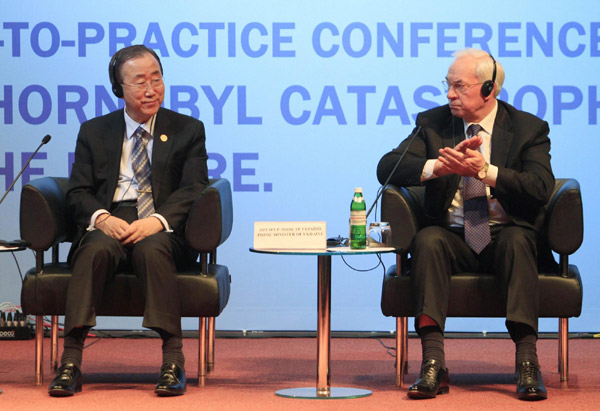Global General
UN chief: More nuclear accidents are likely
(Agencies)
Updated: 2011-04-21 09:26
 |
Large Medium Small |
|
 Ukrainian Prime Minister Mykola Azarov (R) and Secretary-General of the United Nations Ban Ki-moon take part in the International Research-to-Practice Conference "Twenty Five Years after Chernobyl Catastrophe. Safety for the future" in Kiev, April 20, 2011. [Photo/Agencies] |
KIEV, Ukraine - The world must prepare for more nuclear accidents on the scale of Chernobyl and Japan's Fukushima Dai-ichi plant, the UN chief warns, saying that grim reality will demand sharp improvements in international cooperation.
"To many, nuclear energy looks to be a relatively clean and logical choice in an era of increasing resource scarcity. Yet the record requires us to ask painful questions: have we correctly calculated its risks and costs? Are we doing all we can to keep the world's people safe?" Ban said. "The unfortunate truth is that we are likely to see more such disasters."
During a brief visit to the explosion site 60 miles (100 kilometers) north of the Ukrainian capital earlier in the day, Ban proposed a strategy for improving nuclear energy security worldwide, including strengthening the International Atomic Energy Agency and devoting more attention to "the new nexus between natural disasters and nuclear safety."
The ongoing crisis at Japan's Fukushima Dai-ichi nuclear power plant was triggered by last month's huge earthquake and the ensuing tsunami that flooded the plant.
"Climate change means more incidents of freak weather," Ban said in Kiev. "Our vulnerability will only grow."
IAEA head Yukiya Amano, who accompanied Ban on the trip to Chernobyl, echoed those sentiments.
"Many countries will continue to find nuclear power an important option in the future, and that is why we have to do our utmost to ensure safety," he said, speaking a few hundred yards (meters) from the exploded reactor, which is now covered by a hastily erected sarcophagus.
The sarcophagus has gone past its expected service life and work has begun to build an enormous shelter that will be rolled over the reactor building. The new shelter, designed to last 100 years, is expected to be in place by 2015, but a substantial amount of money for the project is still lacking.
An international donors conference Tuesday in Kiev sought to raise euro740 million ($1.1 billion) for the shelter and a storage facility for the spent fuel at the plant's other decommissioned reactors. But in the face of global economic problems, some countries held back from making funding promises and the pledges only came to euro550 million ($798 million).
The Chernobyl explosion on April 26, 1986, spewed a cloud of radioactive fallout over much of Europe and forced hundreds of thousands from their homes in the most heavily hit areas. A 30-kilometer (19-mile) area radiating from the plant remains uninhabited except for some plant workers who rotate in and several hundred local people who returned to their homes despite official warnings.
| 分享按鈕 |



